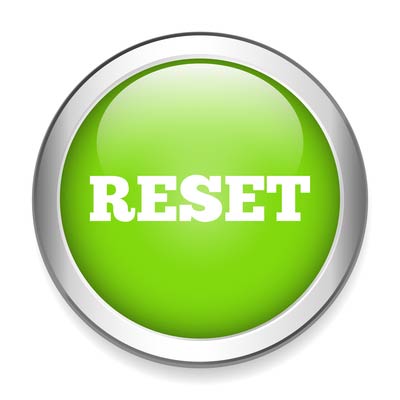 Just like our computers at times in our culture , as well as in our lives, we just need a “reset”—to start fresh, to operate better, to function properly. These moments of awareness that “something is off”, or “we can do better” signal a huge opportunity for positive change. For all of us, in large and small ways, it can also be a mourning for the loss of what we thought we had, or loved, and what is now just not working. This is the time of acknowledging the massive changes in our world, realizing the discontent, as well as the opportunity, in our times, asking us if we can do better, should we do better, can we do better?
Just like our computers at times in our culture , as well as in our lives, we just need a “reset”—to start fresh, to operate better, to function properly. These moments of awareness that “something is off”, or “we can do better” signal a huge opportunity for positive change. For all of us, in large and small ways, it can also be a mourning for the loss of what we thought we had, or loved, and what is now just not working. This is the time of acknowledging the massive changes in our world, realizing the discontent, as well as the opportunity, in our times, asking us if we can do better, should we do better, can we do better?
RESET in our time is both a demand, and an opportunity, to embrace change
We can no longer just say everything is about “COV-19” and hope for returning to the proverbial “normal”. The shock of the invasion and war in Ukraine has quickly changed our focus. Change has occurred, and but those of us that watch, know that change has been occurring all along, COV-19 was an accelerant to that change–and perhaps now higher gas prices–set by our own producers–is now. I am not talking about masking up, or giving up, but small and large changes that point to a massive shift in how we live, what we want, what we are willing to do as we live our lives going forward.
Perhaps a more clear realization that life is short, as we all have taken in so much death and sadness, but realizing now with some urgency, what we do matters.
The Great Resignations? At this time, 50% of Wisconsin women and a slightly lesser percentage of men, are actively considering a new path in their work/life balance. Many of us are coming to realize that balance is key. It isn’t easy for most women to make these determinations, and there isn’t consistency for all women either–we all have different needs, family situations, resources, abilities, inclinations and training. Recent U.S. Labor Department data indicates that nationwide, resignations are hitting an all-time high, for instance, at 4.5 million in two consecutive months (August/September 2021), which is a significant jump. While this may be concerning to some, and might in some circumstances be related, recent surveys indicate otherwise, that perhaps something greater is happening in culture itself, priorities are being realigned, questions about what actually makes a happy, or sustainable life, and world, are coming into focus.
 Although surveys and data from a variety of sources offer clues, the picture might actually be bigger, as well as the solutions required to stabilize.
Although surveys and data from a variety of sources offer clues, the picture might actually be bigger, as well as the solutions required to stabilize.
The ability to work remotely and the emergence of flex office time
Flexible work accommodates life, and is a game changer for many. As in most things, it is a double edged sword—the cutting edge of juggling too much at home, from care of family to too much isolation, and challenges to focus and space needs of creating a remote office. Corporations that can navigate addressing these issues for their teams will be the ones to reap the benefits of a motivated, committed workforce.
The Service Sector needs a reset
In the struggling service sector, which has evolved into a major sector of American industry in the last 30 years thanks to the erosion of manufacturing type careers, it is a different story. Years ago, it was common to make a commitment to the restaurant wait staff in terms of time and dates working, rather than a more common situation recently of “on call” staffing, which creates havoc and cost for those employees just to work, as this affects childcare, commuting expense, and real income. What was once a great entry level pathway to learning new skills and gaining experience is now a bit more problematic, and given more of us are choosing to get take out or go out in lieu of cooking at home, demand is high. Life requires planning, and on call staffing doesn’t allow for that. From a worker standpoint, challenges abound in creating a workable stable family environment, and dealing with attending to appointments for school and health. Changing these service job relationships back to a more considerate relationship from both customers and business owners will keep workers that will make a career choice to do these jobs, or for those on the first rung of the ladder.
Do we really need all this stuff?
Flexibility is key, but piling on the work can also backfire. One management level friend explained her experience with working at home during the pandemic’s early times as suddenly becoming almost a 24/7 expectation of handling a department with an increase in work without the increase in employees to do the work. Good news for the business, which made her team incredibly productive (and stressed) as they dealt with a huge jump in demand for their product fueled by increased consumption in general . We too have contributed to our own “supply chain” issues as we have all clicked our way to satisfaction in the past few years. Now, as the team transitions to being in the office, that level of productivity is now the expectation, and is ridiculously not sustainable from a variety of perspectives. All good for the corporate bottom line, but also inappropriate for a work and life balance. Flex time works, but it cannot become a trade off of even more onerous work load.
Smart corporations are working with their associates to attend to this balance, and also striving to maintain team culture and those all important informal connections. Old school corporate types that aren’t striving to change and adapt are struggling to find great team member, or finding them looking for greener pastures. Flexible working conditions also work for young careerists who have stood up and asked loudly, “is THIS all there is?” as well as older adults managing care and accountability for young, old, or disabled loved ones. These too are the people who are exhaustingly saying “I CANNOT do it all –and I want a better life than this!”
So the reset is here. No surprise.
A better life–why not?
Why does this issue matter so much? It isn’t just about “making lazy workers happier and paying them more”. It is about the realities of our policies, individual desires, and governmental and corporate life that shapes our time here on earth. The question is, “Why CAN’T we all have a better life–a pathway that is livable as we adjust working our way up through small and large jobs. Why can’t we work really hard, and have balance as well? To be clear, I am not advocating that a “Better Life” has anything to do with sharing all the wealth or being monetarily “rich”. A better life means balance–humane policies, balancing who each of us are in the context of a sustainable life in this world while attempting to balance the need to be contributors to society and to our own families. We have to encourage the thrill of working and being, as well as the mindset of helping one another navigate life when tough times make doing so impossible.
RESET Caregiving for our elderly, our disabled, our children
Caregiving is both big business, a huge need, and also a limited resource for many that either need, or want, to ensure positive care to their loved ones. Facilities are expensive, or nonexistent for many, and also many families can provide the best care possible, but at a cost to the caregiver that is not earning. Flexibility is key, but also dealing with the realities that trying to do too much is not ideal.
The industry of caring for others is in a crisis situation, as these jobs have often not paid as well (and for loved ones who take on this challenge– not at all) as they should be paid, despite the incredibly important work and need for caring, skilled, and reliable staffing.
RESET to Promotions Matter–Higher income or additional benefits and skills to be won
We are all, as workers producing results for others, realizing our worth. And asking ourselves, can we do better? Better career moves, which result in more compensation, more life work balance, and, let’s face it, a better fit. So that means, more people are “moving on up”, but does that also mean more people are getting on the ladder at starter jobs?
Not necessarily.
New technologies, and new expectations for young and old are pushing for change, and tech makes it easier to achieve income in ways unthought of just a decade ago. Additionally, expectations for all workers have changed–a better balance of work and life, more flexibility, and that means promotions for the skilled. The need for internships and apprenticeship programs are necessary for so many skilled positions that require training. The rise of gig work life for entrepreneurs, volunteers, and those not easily fitting in professional roles or based on their current skillset also allows for a new way to gain experience and skills..
RESET Governmental, Corporate Polices and Cultural Norms
In the case of what must be located here for the most part, Agriculture, and particularly big Ag is a monopoly that also needs some overhauls. It is not because suddenly front line ag workers are making so much money in the field these days that your food costs are rising. It is more so the issue of a monopoly on processing. An unfettered monopoly is a governmental policy failure that is just not being enforced.
All agricultural units rely on demanding, skilled work and many of those working are immigrants,bringing with them the desire to work at, for many Americans, at less than desirable jobs. Our immigration policies can and should be dealt with–allowing for safe and secure borders, AND the ability to have skilled agricultural workers (immigrating here as seasonal workers or striving to become or being American citizen). These people are doing those critical jobs that should mean living wages. Those industries, and policies, that keep us stuck in the past will need to adjust–and adjust as well our incentives for attracting young Americans to this vital industry so a good living can be earned, a pathway to ownership of land is possible for the next generation, ideally resulting in a work and life balance.
Entertainment vs. Skills
Our policies about nurturing fresh young and old workers willing to handle (perceived) less appealing jobs also needs to change. American culture abdicated its own freedoms over 30 years ago as corporate giants decided to compete in the world with their products by relocating overseas, reducing their costs, and American jobs were lost. In that time, we also embraced the culture of primarily entertaining ourselves and consuming cheap goods at the expense of teaching ourselves what we need to know to survive. Recapturing the idea that work experience and skill accumulation will be rewarded, and is a sustainable path must occur.
We became both service industry dependent, and entertainment addicted. So much so that schemes to make income in 2022 have resulted in servicing that addiction, as a way to profit from it—such as via YouTube, TikTok, and reality show competitions. This isn’t new, and is ironically a throwback to the Great Depression when so many earned money via competitions requiring to win—to be the last one standing after an excruciating effort would win the prize. Meanwhile, the country is literally drugging, shooting, flooding and burning itself to death, while we watch the screens, fascinated with the wreckage.
If we are smart enough, RESET doesn’t mean “I can’t get workers” to work! RESET means we adjust, we adapt, we change and embrace ways to a sustainable future, and leave behind shortsighted behaviors, policies and norms that really don’t serve us individually, or as society, any longer.
The RESET is actually a Win Win–short term for many–long term for all
Change is hard is the old saying. Which is incredibly ironic because change is constant, and it is not only doable, it is the thing that keeps us alive, thriving, and interested in the world.
So, short term, you may resent the way you aren’t hanging out in crowded restaurants any more, or being asked to mask up in some situations, but perhaps you are appreciating your family in ways you never imagined. Perhaps you are stressed out about your new promotion or business, but realize that you have freedoms you did not enjoy previously. Maybe you are frustrated that “thing” you ordered tooks months (and in some cases, a year!) to arrive, but perhaps you are realizing that you could still survive without it.
The Great Reset is not just “getting used to a post COV-19 normal”, but maybe it is the greatest opportunity and shake up we all needed to consider larger questions about our place in the world as individuals and as a society. By taking on the challenge to direct change, not just “adjust to it”–hitting that RESET button by doing what is needed to make that reset happen is actually the best thing that could happen.
That is good for you, your family, and the world.

